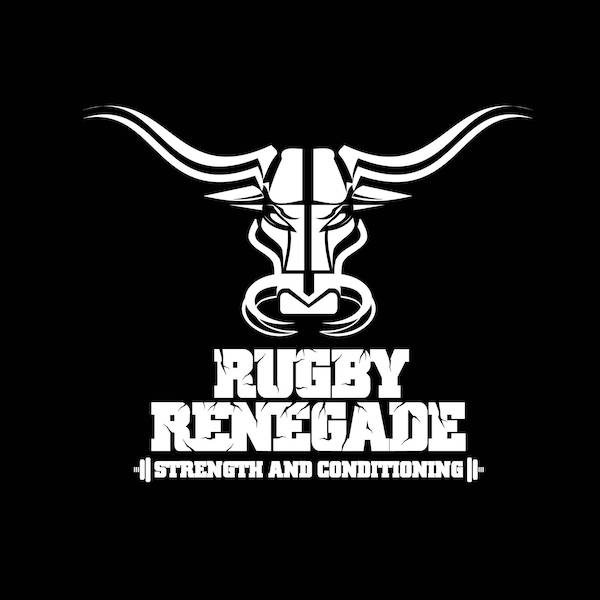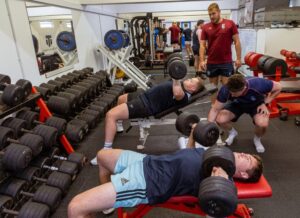You’ve all seen players training and playing wearing heart rate belts and GPS vests. But you probably don’t know the real benefits of wearing them and what you can learn from them to help your training. The purpose of this article is to explain the benefits and give you some take home tips to improve your training, fitness and rugby performance…
Benefits
Don’t believe what some players will tell you, GPS and Heart rate monitoring is not used to catch players out or tell them they aren’t working hard enough!
When it comes down to it monitoring training load has two main purposes:
Improve Player Welfare – Reduce Injury Risk
Improve Performance – Increase fitness to meet the specific demands of the game
There is loads of research going on by all the clubs and other organisations into how best to use the data gathered to achieve these two goals. Tim Gabbett has been leading the way in this regard for some time and here is a brief summary of some of his studies that you can apply to your own training to do both.
Stronger Tackling
One of Gabbett’s studies looked at how athlete’s physical capacities compared to performance in a repetitive tackle test. Gabbett found that athletes with greater squat strength had better tackling technique and were less susceptible to fatigue in the tackling test. This just highlights the importance of lower body strength and of course the importance of squatting in your training. Of course you still need to practice tackling though! Sorry!
http://www.ncbi.nlm.nih.gov/pubmed/26813629
Stronger Fitter Players = Better!!
Again this shouldn’t be a surprise. But that’s not all! Gabbett’s study compared physical tests with players GPS data in games, they found that stronger, fitter players had a greater work rate and greater high intensity running distance. The surprising thing they found though was that despite performing more work at a higher intensity they also recovered quicker from games and were able to maintain performance over multiple games. who wouldn’t want that?
http://www.ncbi.nlm.nih.gov/pubmed/24594214
Chronic:Acute Work Loads
“It isn’t high training loads that increase injury risk but it is how you get there.”
It is important to understand that you need to train hard and with a decent volume to prepare yourself for the rigours of competition. If you train with too low a volume you risk injury by not preparing for this. So it isn’t high training loads that increase injury risk but it is how you get there. It seems that spikes or sudden decreases in training are what increase injury risk.
Gabbett likens it to when you stop drinking for a while and you lose your tolerance for alcohol. The next time you drink as much as you used to, you are surprised the next day by the mother of all hangovers! Gabbett has come up with the chronic:acute ratio to work out how much volume you can tolerate. Chronic is your average load over the previous 4 weeks and acute is the last weeks load.
So if you have built up to a decent running volume over the last 4 weeks then suddenly go off on holiday for a week and do nothing you are at risk of a big spike when you return. This will leave you at greater risk of injury especially if your try to jump back in at your previous training volume.
A better approach would be to try and do something during your week off and then drop your volume when you return and build back up slowly again. A good guide is to increase volume by only 10-20% per week.
http://bjsm.bmj.com/content/early/2015/10/28/bjsports-2015-094817.abstract
Listen to our Podcast with Tim Gabbett
Contact conditioning
In another study Gabbett compared players physical capacities to performance in games with varying amounts of collisions. What he found was that high speed running ability correlated well with performance in games with low number of collisions but not with games with increasing numbers of collisions. This highlights the importance of including physical conditioning as well as just running when training for rugby. Much like a Rugby Renegade metcon!!
http://www.ncbi.nlm.nih.gov/pubmed/23037614
Skill Training after Contact is Hard!
The last paper of Gabbett’s I want to share is more for budding coaches! In this study he looked at players skill performance following conditioning games. He found that skill performance was relatively good after mainly running based games but when contact was introduced skill performance dropped significantly. This would suggest that if you want to develop skill you are better off doing it in isolation, with running conditioning or before contact conditioning. Of course at some point you will want to challenge skill under fatigue from contact work to simulate game intensity but its not best for skill acquisition.
http://www.ncbi.nlm.nih.gov/pubmed/26219106
Wrap up!
I hope that has given you an insight into some of the research going on in rugby at the moment. You’ve got to give it to Gabbett he really is doing some great work that coaches can apply practically. And of course his colleagues should get recognition too as he doesn’t do it alone, it just easier to say one name!
To learn more about Tim Gabbett Click Here.
Hopefully it has highlighted the importance of strength training and given you some ideas of how to remain injury free by modifying your load accordingly. It should also point out the need to conditioning physically as well as just endless running, remember you are preparing to play rugby not run and that means contact conditioning and improved skill!









